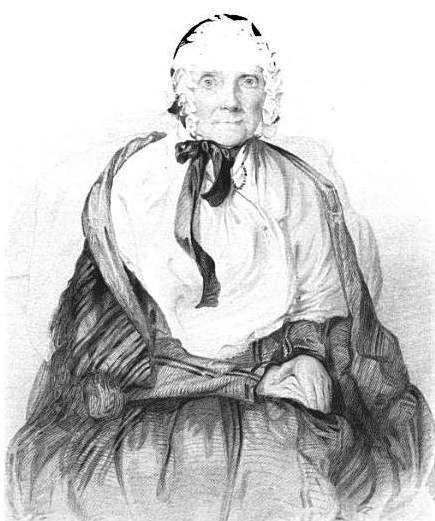
(Wikimedia CC; public domain)
Opposition to the Smith family, well beyond opposition to Joseph Smith himself, began early, as friends turned against them. Lucy Mack Smith, with her two sons Hyrum and Samuel, had joined the Presbyterian Church. Some time later, during the printing of the Book of Mormon, a delegation came from their church, intending to persuade them to disavow the book. The spokesman for the group first addressed the mother. But he received no satisfaction from her. “Deacon Beckwith,” Lucy said, “if you should stick my flesh full of faggots, and even burn me at the stake, I would declare, as long as God should give me breath, that Joseph has got that Record, and that I know it to be true.” The spokesman for the group then turned his attention to Hyrum, asking if he did not think it possible that he had been deceived. “No sir,” Hyrum responded, “I do not.” Finally, when Samuel rather defiantly quoted a passage from Isaiah about “blind watchmen” and “shepherds that cannot understand,” the church leaders left. But they did not leave the Smith family alone. Lucy, Hyrum, and Samuel were suspended as members of the Presbyterian church—a foretaste of the ostracism (and far worse) that lay ahead of them.[1]
The rather naïve account of a “Mrs. Palmer,” who grew up not far from the family of Joseph and Lucy Mack Smith, speaks with simple eloquence of the Prophet’s character, but also of the enmity that his claims aroused even among people of otherwise good will:
My father owned a farm near that of the Smith family, in New York. My parents were friends of the Smith family, which was one of the best in that locality — honest, religious and industrious, but poor. . . . My father loved young Joseph Smith and often hired him to work with his boys. I was about six years old when he first came to our home. I remember going into the field on an afternoon to play in the corn rows while my brothers worked. When evening came, I was too tired to walk home and cried because my brothers refused to carry me. Joseph lifted me to his shoulder, and with his arm thrown across my feet to steady me, and my arm about his neck, he carried me to our home.
I remember the excitement stirred up among some of the people over Joseph’s First Vision, and of hearing my father contend that it was only the sweet dream of a pure minded boy. One of our church leaders came to my father to remonstrate against his allowing such close friendship between his family and the “Smith Boy,” as he called him. My father defended his own position by saying that Joseph was the best help he had ever found. . . .
Not until Joseph had had a second vision and begun to write a book which drew many of the best and brightest people of the churches away did my parents come to a realization of the fact that their friend, the churchman, had told them the truth. Then, my family cut off their friendship for all the Smiths, for ALL the family followed Joseph. Even the father, intelligent man that he was, could not discern the evil he was helping to promote.
My parents then lent all the aid they could in helping to crush Joseph Smith; but it was too late. He had run his course too long. He could not be put down.
There was never a truer, purer, nobler boy than Joseph Smith, before he was led away by superstition.[2]
[1] Lucy tells the story at Lucy’s Book, 466-470. Richard Lloyd Anderson, Investigating the Book of Mormon Witnesses (Salt Lake City: Deseret Book, 1981), 138-139, briefly discusses the corroborating evidence from contemporary Presbyterian sources.
[2] Andrus and Andrus, They Knew the Prophet, 1-2.
Posted from New York City












